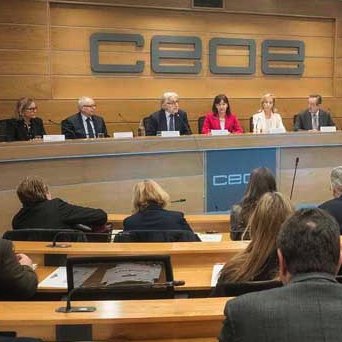

If we extrapolate the trends observed in other studies of the comparative experience to the Spanish case, we could estimate that an adequate diet would save 14.3 billion euros for the Spanish National Healthcare System (SNS). This is one of the main conclusions included in the report “Food & beverages, health and sustainability factors”, promoted by ECCO Spain | Cariotipo Lobby & Communication, with the support of the Spanish Confederation of Employers’ Organizations (CEOE) and the Spanish Heart Foundation, and the sponsorship of Eurosemillas.
 The Report was presented to representatives of institutions and food & beverages industry at the headquarters of the Confederation of the Spanisch Employers’ Organizations (CEOE).In this document, which has been presented at the CEOE headquarters, before institutional representatives and companies in the food & beverages sector, a multidisciplinary group of experts analyzes the challenges faced by the different actors involved in the food & beverages chain, in the field of health, politics, environment, economy, governance, communication or genomics; and highlight the role that food & beverages play as a public health engine.As explained during the presentation of the report Carlos Macaya MD, president of the Spanish Heart Foundation, “a healthy diet is key during all life’s phases, in addition to prevent diseases, it is important in the elderly because it avoids nutritional deficiencies and maintains a better quality of life”.
The Report was presented to representatives of institutions and food & beverages industry at the headquarters of the Confederation of the Spanisch Employers’ Organizations (CEOE).In this document, which has been presented at the CEOE headquarters, before institutional representatives and companies in the food & beverages sector, a multidisciplinary group of experts analyzes the challenges faced by the different actors involved in the food & beverages chain, in the field of health, politics, environment, economy, governance, communication or genomics; and highlight the role that food & beverages play as a public health engine.As explained during the presentation of the report Carlos Macaya MD, president of the Spanish Heart Foundation, “a healthy diet is key during all life’s phases, in addition to prevent diseases, it is important in the elderly because it avoids nutritional deficiencies and maintains a better quality of life”.
However, the reality is that the number of people with obesity has tripled in the last forty years in Spain. This pathology becomes more alarming in childhood. In fact, childhood and youth obesity in Spain has a prevalence of 10.30%, according to data provided by the Spanish Heart Foundation (FEC).
Diet and fake news
Another aspect that analyzes the report is the one related to communication and food & beverages crises. The excess of information in which the online universe immerses us, often makes the user not stop to assess whether what they are receiving is objective content, based on accredited sources, or if it is only an opinion based on weak arguments.
In fact, 57% of Spaniards admit to having considered as true a story that was not related to the food & beverages sector. In addition, according to data from the Spanish Federation of Food and Beverage Industries (FIAB), 30% of the fake news that we can find on internet are about food and diets.
Nutrition experts have been warning of how unofficial and non-professional sources are monopolizing the communication of the “healthy diet” in the media and in the social media channels. “The problem is that this type of information without scientific support, which is transmitted through the media, can put public health at risk,” affirms Carmen Mateo, president of Cariotipo and coordinator of the report.
Carmen Mateo also adds that in order to fight against misinformation, “coordination between institutions, companies in the food & beverages sector, nutrition experts and communication professionals is essential to achieve a properly informed society”.
In relation to food & beverages crises, María Dolores Rubio MD, medical director of the Dr. Rodríguez Lafora Hospital (Madrid), has influenced the responsibility of all players in the food chain. “It is true that there may be problems in the production circuits; however, the responsibility for foodborne illness is not always from the producer, but a great part of them are caused by food that have been prepared or handled incorrectly at sale points or at home”. A good communication strategy is a key element to success in managing a food & beverages crisis.
Food and environment
Bad eating habits not only contribute to health problems, but also affect the environment due to the production model.
When we analyze the “life cycle” of a product, we notify that: the use of insecticides and other components are toxic and dangerous; the use of plastic for food preservation is excessive; and the waste of food is serious. In Europe, 30% of food is wasted, which is equivalent to 179Kg per person per year.
In this sense, companies, whether due to obligations derived from their national regulations or market requirements, are evolving “towards much more sustainable models, using variables such as carbon footprint reduction, product life cycle analysis and an orientation towards a more circular economy model” says Miguel Aguado, CEO of B Leaf.
Access to the ECCO Global Communications Network is simple. Contact information for a specific geography is available on the agency overview pages accessed here or contact the ECCO Global Communications office via email info@ecco-network.com.